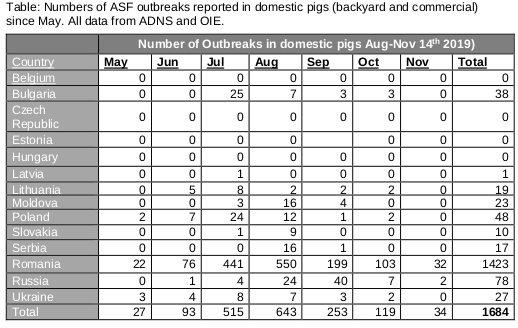#14,535
Although the spread of African Swine Fever (ASF) in China and now much of Southeast Asia has made the biggest headlines over the past 15 months, the deadly pig virus can also be found in Russia, Eastern and - more recently - Central Europe.
The virus - which had been eradicated on the continent since 1995 - reappeared in the Republic of Georgia in 2007 (see African Swine Fever Virus Isolate, Georgia, 2007), possibly brought in by ASFV contaminated feed products.Over the past 12 years ASF has spread both east and west - slowly at first - but gaining speed over the past several years. In September of 2018, the virus was found in wild boar in Belgium - signifying a westward jump of more than 500 km (see OIE Notification: African Swine Fever Jumps To Belgium) - raising the stakes for all of western Europe.
Over the past 6 months Europe has reported nearly 1700 outbreaks in domestic pigs (backyard and commercial), with the vast majority reported from Romania. Additionally, over 2500 wild boar have tested positive since May, again with Romania leading the pack.
While ASF doesn't pose a direct threat to human health, its continued spread in Asia and Eastern Europe poses an existential threat to their pork industry, as the virus is often 100% fatal in pigs, and no vaccine is currently available.
Below we have the UK's latest DEFRA (Department for Environment, Food and Rural Affairs) update on ASF activity in Eastern Europe. I've only included some excerpts from a much larger report, so follow the link to read it in its entirety.When you return, I'll have a brief postscript.
Updated Outbreak Assessment #05
African swine fever in Europe (Eastern Europe & Belgium)
14 November 2019
Ref: VITT/1200 ASF in Europe (Eastern Europe & Belgium)
Disease report
Since our last report on the 19 August 2019 (LINK) there have been new outbreaks of ASF in domestic pigs in Eastern Europe, and cases in wild boar in Eastern Europe and Belgium.
These include outbreaks in domestic pigs in larger, commercial holdings (with more than 500 pigs) in Bulgaria, Poland, Romania, Ukraine and Russia.
The number of outbreaks in domestic pigs in Eastern Europe peaked in August and dropped significantly thereafter (see table below). This seasonality is not unexpected and the pattern is similar to what we have reported in previous years and may be due in part to fewer contacts with wild boar following the end of the harvesting period:(LINK).
The largest number of outbreaks in domestic pigs each month continues to be in Romania, with 617 outbreaks observed in domestic pigs since our last report on 19 August, including 20 in large, commercial holdings, with four in October and one in November to date. The majority of recent outbreaks involve backyard holdings and infected piglets; this could be due to increased piglet production for consumption during the winter festive period.
(SNIP Country by County Summary)
Conclusion
The risk remains at medium for the entry of contaminated or infected products into UK at present. Border checks on passengers are paramount, as are publicity campaigns aimed at reaching the travelling public and reminding them that bringing back products of animalorigin from outside the EU or from a region in the EU under disease restrictions is not allowed. Commercially produced products which can be safely traded in the EU will be labelled as such. Home produced products are a particular concern.
All travellers are strongly advised to avoid bringing any pork products – including ham,sausages or pâté – back to the UK from affected parts of Europe. Travellers from Asia and other third country areas who bring meat or dairy products can also face prosecution and a large fine. Disease can be spread by pig keepers and members of the public feeding catering waste, kitchen scraps or pork products to their animals. It is illegal to do so.
The risk of exposure to the pig population in the UK is still highly dependent on the level of biosecurity on individual pig premises but is still considered to be low.
We will continue to monitor the situation.
Authors
Dr Lauren Perrin
Dr Francesca Gauntlett
Joe Bowen
Alastair George
African Swine Fever, and its only slightly less dangerous cousin Classical Swine Fever, have been making new inroads around the globe for the past dozen years, and show no signs of slowing.
While no one has an exact total, there are estimates that a quarter of the world's pig production has been lost over the past year due to ASF.So far, Western Europe, Australia, and North and South America have been spared - and each of these regions is doing what they can to prevent its entry - but success is far from assured.
We've seen concerns raised by U.S. and Canadian Stakeholders (see ASF in China Prompts Call for Pork Producers to Think Feed Safety and Five Possible Pathways ASF Could Enter Canada), along with our own USDA, which issued a 28-page ASF response plan last spring.
Last May the USDA announced enhanced testing and surveillance for ASF in American pigs, in hopes of detecting - and stamping out - any infections as early as possible.
A little over a month ago, in Nature Sci. Rpts: Risk of African Swine Fever Virus Introduction into the United States, we looked at a study that attempted to quantify the risk.
While it was not possible to come up with an exact answer, the report found that the odds of it happening have increased significantly over the past couple of years.So we watch the progress of ASF, both in Asia and in Europe, with more than just academic interest. For more, you may wish to revisit:
African Swine Fever's (ASF) Other Impacts; Pharmaceuticals, Bushmeat, and Food Insecurity


